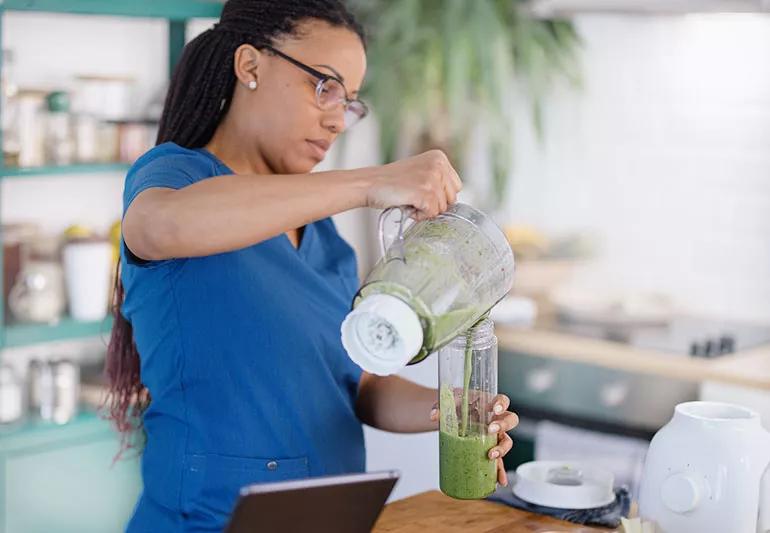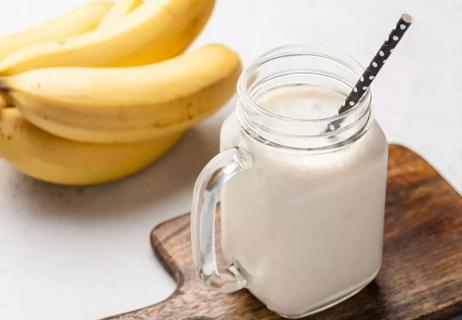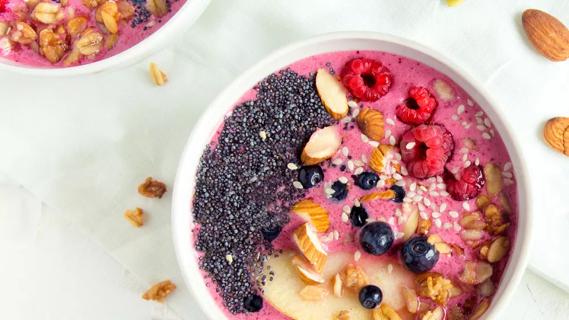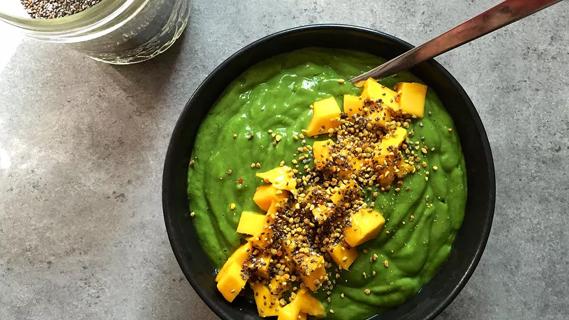Tips for blending powerful nutrients to aid treatment and recovery

If you’ve been diagnosed with cancer, your appetite may not be what it once was. Yet you need nourishment now more than ever to stay strong during treatment and throughout recovery.
Advertisement
Cleveland Clinic is a non-profit academic medical center. Advertising on our site helps support our mission. We do not endorse non-Cleveland Clinic products or services. Policy
“Smoothies are a delicious way to build key nutrients into your diet,” says dietitian Mia DiGeronimo, RD, LD, an expert on nutrition for those who have cancer.
Here are tips for making smoothies with ingredients that boost strength and flavors that you’ll find appealing and easy on the stomach.
The following combinations make about 2 servings each.
Use 2 cups of one of the liquids below:
Add 1 cup of slightly sweet, fiber-rich fruit to promote digestive health and to balance multiple flavors:
Advertisement
Include 1 cup of dark-colored fruit to take advantage of their cancer-fighting phytochemicals. These options all have heart-healthy antioxidant plant compounds:
Add 1 cup of tightly packed leafy greens to provide your body with B vitamins and iron to help reproduce blood cells, as well as other nutrients:
Try adding in some protein to stabilize your blood sugar:
Did you know healthy fats help absorb nutrients as well as keep you feeling fuller, longer?
If you’re looking for more ways to get your calorie count up, you can always add any of these ingredients:
If you’re feeling nauseous or have an upset stomach from treatment, try adding in:
It’s important to keep in mind that nutrition is very individualized for everyone, especially for those with cancer.
Smoothie recipes should be modified based on your preferences, what you can tolerate, and cater to different side effects you’re experiencing from chemotherapy or radiation.
Advertisement
“It can be difficult to find the right smoothie ingredient combination, especially if you’re just getting started with treatment,” says DiGeronimo. If patients are struggling with what to eat, they should make an appointment with a registered dietitian.
Advertisement
Learn more about our editorial process.
Advertisement

Opt for nutrient-dense, fiber-filled and protein-rich ingredients to reap the benefits of these healthy bowls

Packed with protein, healthy fat, vitamins and minerals, this smoothie will help keep you energized for your day!

A dreamy-creamy, delicious way to fuel your day

A creamy smoothie with crunchy toppings — in a bowl!

With leafy green spinach, sweet mango and green grapes, this smoothie will refresh and replenish you

Wearing a scarf, adjusting your outdoor activities and following your asthma treatment plan can help limit breathing problems

Your diet in the weeks, days and hours ahead of your race can power you to the finish line

When someone guilt trips you, they’re using emotionally manipulative behavior to try to get you to act a certain way